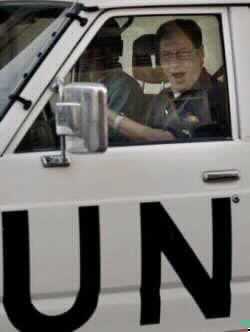- Author:
& News Agencies - Section:
WORLD HEADLINES
- Hajj & Umra WORLD HEADLINES
U.N. Inspectors Complete First Mission in Iraq

U.N. arms inspectors completed their first field mission in Iraq in four years Wednesday, the opening move in their search for banned Iraqi weapons of mass destruction.One group of inspectors spent about three hours at a large military compound east of Baghdad before returning to their headquarters at the old Canal Hotel on the outskirts of the capital at noon.
There was no immediate word from the inspectors, but an Iraqi official said the inspection went smoothly.
"They had questions and we replied to all of them and there were not any problems," Haitham Mahmoud, head of the compound, called "Challenge Factory," told reporters in English.
He said the complex was a workshop to maintain water pumps and machinery.
The inspectors had left their headquarters at 8:30 a.m. and split into two groups, escorted by officials from Iraq's National Monitoring Directorate.
The first convoy drove to the compound guarded by troops about 12 miles to the east. The second convoy drove to a small industrial complex 90 miles northeast of Baghdad.
The inspections are in line with U.N. Security Council Resolution 1441, which offers Iraq a last chance to give up weapons of mass destruction which it denies possessing.
The United States has threatened a war on Iraq if it does not disarm.
"I think everybody feels excited and anxious to get going and very determined to start this systematic inspection," Melissa Fleming, spokeswoman for the International Atomic Energy Agency (IAEA), told reporters as inspectors left their hotel.
"We are just hopeful that things will go well today. We are looking forward to a good day of inspection," Fleming said.
U.N. Secretary-General Kofi Annan , asked by France's Europe 1 radio about the start of the inspectors' mission, replied "I think it got off to a rather good start."
If Iraq allowed the inspectors to work without hindrance and they found nothing illegal, economic sanctions on Iraq might be lifted or at least suspended, said Annan, who is on an official visit to Paris.
TIGHT SECURITY
The military compound visited by UNMOVIC inspectors is run by Iraq's Military Industrialization Commission. It has several buildings and security was tight.
Iraqi guards at the gate stopped journalists from accompanying the experts.
A large portrait of President Saddam Hussein with the slogan "God preserve Iraq and Saddam" stood by the gate.
Journalists in around 50 cars had raced behind the convoys of white cars carrying the U.N. symbol across Baghdad, a city of around five million people.
Baghdad has been given until December 8 to declare any nuclear, chemical or biological weapons in an initial report to the United Nations Security Council.
Iraq denies having any such weapons. But Washington is convinced that Iraq does have them, and President Bush has warned that Saddam would be entering his "final stage" were he to stick to such a blanket denial.
The inspectors gave up their post-Gulf War quest in 1998 in the face of Iraqi obstruction -- notably over access to numerous "presidential sites."
The heads of the inspection teams said Tuesday they would leave no stone unturned on their missions and that, unlike their predecessors, they had a strong mandate to look inside Saddam's own, sprawling palace compounds at any time.
Under Resolution 1441, which was approved on November 8, the inspectors must give their first report to the Security Council by Jan. 27.
The weapons inspectors will go to sites declared by Iraq, previously visited sites, sites that have been importing materials that need to be verified and new ones gleaned from satellite photos.
Some 20 tons of equipment have already been flown in from Cyprus, including communications gear, computers, furniture and medicines. By mid-December, the team will have helicopters to help monitor large sites while inspections are taking place.
Some of the equipment to be used includes complex ground- penetrating radars which can uncover underground facilities as well as radioactive isotope detectors.
A spokesman for the team in Baghdad has said inspections will probably focus first on sites visited by earlier inspectors, to check if equipment left there was still working.
The 17 inspectors who arrived late Monday have met Iraqi officials and prepared equipment to vet hundreds of sites.
Some of the inspectors have been in Iraq before.
The first group is made up of 11 officials from UNMOVIC and six from the IAEA. A further 30 to 35 inspectors will fly in on Dec. 8 and by late December there should be between 80 and 100 in Iraq.
PHOTO CAPTION
Members of the 17-strong UN inspections team start their work in the search for weapons of mass destruction after a four-year gap in Baghdad November 27, 2002. The start of inspections marks the countdown to a December 8 deadline for Baghdad to declare any nuclear, chemical or biological weapons in an initial report to the United Nations Security Council, with the threat of a U.S.-led attack looming. (Suhaib Salem/Reuter
Related Articles
 Hajj virtues
Hajj virtues
-
School of Faith in Ten Days of Thul-Hijjah
The believing human self needs strong provocations in order to awaken whenever it is enveloped by laziness in...
-
The Status of Hajj in Islam
Hajj is the fifth pillar of Islam; Allah, The Exalted, ordained it in the ninth year after Hijrah (the Prophet's,...
-
School of Faith in Ten Days of Thul-Hijjah
The believing human self needs strong provocations in order to awaken whenever it is enveloped by laziness in relation...


 Home
Home Discover Islam
Discover Islam Quran Recitations
Quran Recitations Lectures
Lectures
 Fatwa
Fatwa Articles
Articles Fiqh
Fiqh E-Books
E-Books Boys & Girls
Boys & Girls  Hajj Rulings
Hajj Rulings Hajj Fatwas
Hajj Fatwas












